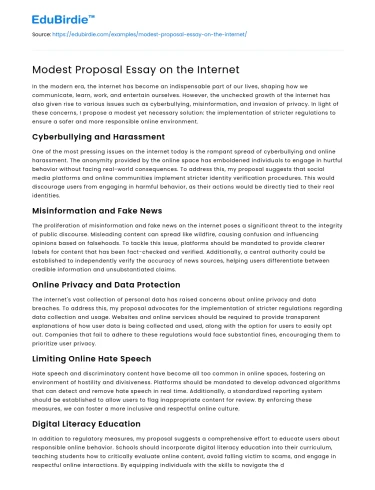In the modern era, the internet has become an indispensable part of our lives, shaping how we communicate, learn, work, and entertain ourselves. However, the unchecked growth of the internet has also given rise to various issues such as cyberbullying, misinformation, and invasion of privacy. In light of these concerns, I propose a modest yet necessary solution: the implementation of stricter regulations to ensure a safer and more responsible online environment.
Cyberbullying and Harassment
One of the most pressing issues on the internet today is the rampant spread of cyberbullying and online harassment. The anonymity provided by the online space has emboldened individuals to engage in hurtful behavior without facing real-world consequences. To address this, my proposal suggests that social media platforms and online communities implement stricter identity verification procedures. This would discourage users from engaging in harmful behavior, as their actions would be directly tied to their real identities.
Save your time!
We can take care of your essay
- Proper editing and formatting
- Free revision, title page, and bibliography
- Flexible prices and money-back guarantee
Misinformation and Fake News
The proliferation of misinformation and fake news on the internet poses a significant threat to the integrity of public discourse. Misleading content can spread like wildfire, causing confusion and influencing opinions based on falsehoods. To tackle this issue, platforms should be mandated to provide clearer labels for content that has been fact-checked and verified. Additionally, a central authority could be established to independently verify the accuracy of news sources, helping users differentiate between credible information and unsubstantiated claims.
Online Privacy and Data Protection
The internet's vast collection of personal data has raised concerns about online privacy and data breaches. To address this, my proposal advocates for the implementation of stricter regulations regarding data collection and usage. Websites and online services should be required to provide transparent explanations of how user data is being collected and used, along with the option for users to easily opt out. Companies that fail to adhere to these regulations would face substantial fines, encouraging them to prioritize user privacy.
Limiting Online Hate Speech
Hate speech and discriminatory content have become all too common in online spaces, fostering an environment of hostility and divisiveness. Platforms should be mandated to develop advanced algorithms that can detect and remove hate speech in real time. Additionally, a standardized reporting system should be established to allow users to flag inappropriate content for review. By enforcing these measures, we can foster a more inclusive and respectful online culture.
Digital Literacy Education
In addition to regulatory measures, my proposal suggests a comprehensive effort to educate users about responsible online behavior. Schools should incorporate digital literacy education into their curriculum, teaching students how to critically evaluate online content, avoid falling victim to scams, and engage in respectful online interactions. By equipping individuals with the skills to navigate the digital landscape responsibly, we can create a more informed and discerning online community.
Conclusion
While the internet has undoubtedly revolutionized the way we live and interact, its unchecked growth has brought about a myriad of challenges. Implementing stricter regulations to address issues such as cyberbullying, misinformation, privacy breaches, and hate speech is not only a modest proposal but also a necessary step toward creating a safer online environment. By striking a balance between freedom of expression and responsible behavior, we can ensure that the internet remains a valuable tool for progress and communication, while also safeguarding the well-being of its users.






 Stuck on your essay?
Stuck on your essay?

